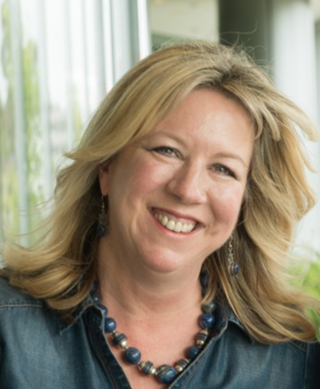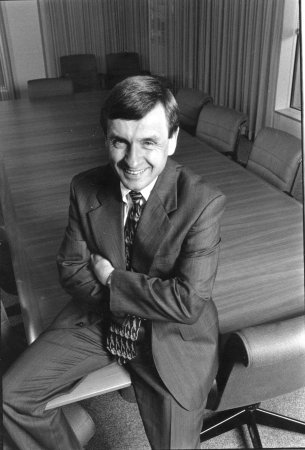UC San Diego Health is the academic health system of the University of California, San Diego in San Diego, California. It is the only academic health system serving San Diego and has one of three adult Level I trauma centers in the region. In operation since 1966, it comprises three major hospitals: UC San Diego Medical Center in Hillcrest, Jacobs Medical Center in La Jolla, and UC San Diego Health East Campus Medical Center in East County. The La Jolla campus also includes the Moores Cancer Center, Shiley Eye Institute, Sulpizio Cardiovascular Center, and Koman Family Outpatient Pavilion, and the health system also includes several outpatient sites located throughout San Diego County. UC San Diego Health works closely with the university's School of Medicine and Skaggs School of Pharmacy to provide training to medical and pharmacy students and advanced clinical care to patients.
Douglas D. Richman is an American infectious diseases physician and medical virologist. Richman's work has focused on the HIV/AIDS pandemic, since its appearance in the early 1980s. His major contributions have been in the areas of treatment, drug resistance, and pathogenicity.

The University of California, San Diego School of Medicine is the graduate medical school of the University of California, San Diego, a public land-grant research university in La Jolla, California. It was the third medical school in the University of California system, after those established at UCSF and UCLA, and is the only medical school in the San Diego metropolitan area. It is closely affiliated with the medical centers that are part of UC San Diego Health.
Merle Alden Sande was a leading American infectious-diseases expert whose early recognition of the looming public health crisis posed by AIDS led to the development of basic protocols for how to handle infected patients. He graduated from Washington State University and received his MD degree from the University of Washington, School of Medicine in Seattle.

Steffanie A. Strathdee is a Harold Simon Distinguished Professor at the University of California San Diego School of Medicine and Co-Director at the Center for Innovative Phage Applications and Therapeutics. She is known for her work on HIV research and prevention programmes in Tijuana.
Igor Grant is an American psychiatrist. He is Distinguished Professor in the Department of Psychiatry in the School of Medicine at the University of California, San Diego. He is Director of the HIV Neurobehavioral Research Program (HNRP) and the Center for Medicinal Cannabis Research (CMCR). Grant is the founding Editor of the Journal of the International Neuropsychological Society and founding co-editor of the journal AIDS and Behavior. His work focuses on effects of HIV and drug use, particularly alcohol, medical marijuana, and methamphetamine.

James W. Curran is professor of epidemiology and dean of the Rollins School of Public Health at Emory University. He is an adjunct Professor of Medicine and Nursing, and Co-Director and Principal Investigator of the Emory Center for AIDS Research. He is immediate past chair of the board on Population Health and Public Health Practice of the Institute of Medicine and served on the Executive Committee of the Association of Schools of Public Health. Additionally, he holds an endowed chair known as the James W. Curran Dean of Public Health. Curran is considered to be a pioneer, leader, and expert in the field of HIV/AIDS.

Thomas J. Coates is the Director of the multi-campus University of California Global Health Institute, a UC-wide initiative established to improve health and reduce the burden of disease throughout the world. He is Professor Emeritus at the UCLA David Geffen School of Medicine and Founding Director of the UCLA Center for World Health, a joint initiative of the David Geffen School of Medicine at UCLA and UCLA Health, He has conducted extensive research in the realm of HIV and is the Michael and Sue Steinberg Endowed Professor of Global AIDS Research within the Division of Infectious Diseases at UCLA and Distinguished Professor of Medicine. Health-related behavior is of particular interest to Coates. Throughout his career as a health expert, his theory-based research has been focused on interventions aimed at reducing risks and threats to health

The UC San Diego Medical Center, Hillcrest is one of three medical centers of UC San Diego Health and is a teaching hospital for the University of California, San Diego School of Medicine.
Cheryl Ann Marie Anderson is an American epidemiologist. Anderson is a professor at and founding Dean of the University of California San Diego Herbert Wertheim School of Public Health and Human Longevity Science. Anderson's research focus is on nutrition and chronic disease prevention in under-served human populations.

Robert "Chip" T. Schooley is an American infectious disease physician, who is the Vice Chair of Academic Affairs, Senior Director of International Initiatives, and Co-Director at the Center for Innovative Phage Applications and Therapeutics (IPATH), at the University of California San Diego School of Medicine. He is an expert in HIV and hepatitis C (HCV) infection and treatment, and in 2016, was the first physician to treat a patient in the United States with intravenous bacteriophage therapy for a systemic bacterial infection.

Elizabeth Louise Barrett-Connor was Chief of the Division of Epidemiology and Distinguished Professor at the University of California, San Diego. She investigated the role of hormones in pathogenesis of cardiovascular disease, diabetes and osteoporosis.

Diane Havlir is an American physician who is a Professor of Medicine and Chief of the HIV/AIDS Division at the University of California, San Francisco. Her research considers novel therapeutic strategies to improve the lives of people with HIV and to support public health initiatives in East Africa. She was elected to the National Academy of Medicine in 2019.

Monica Gandhi is an American physician and professor. She teaches medicine at the University of California, San Francisco (UCSF) and is director of the UCSF Gladstone Center for AIDS Research and the medical director of the San Francisco General Hospital HIV Clinic, Ward 86. Her research considers HIV prevalence in women, as well as HIV treatment and prevention. She has been noted as a critic of some aspects of the COVID-19 lockdowns in the US.
David Katzenstein was an American virologist and prominent AIDS researcher. He was professor emeritus of infectious diseases and global health at Stanford University.

Steven Grinspoon is an American physician who is a Professor of Medicine at Harvard Medical School, Chief of the Massachusetts General Hospital (MGH) Metabolism Unit and Director of the Nutrition Obesity Research Center at Harvard. In addition, he is the MGH Endowed Chair in Neuroendocrinology and Metabolism. His work investigates the neuroendocrine regulation of body composition, and physiologic consequences of fat distribution on cardiovascular disease and inflammation. In 2015, he became the Principal Investigator of the NIH-funded Nutrition Obesity Research Center at Harvard.
Onyema Eberechukwu Ogbuagu is an American-born infectious diseases physician, educator, researcher, and clinical trial investigator, who was raised and educated in Nigeria. He is an associate professor at Yale School of Medicine in New Haven, CT and is the director of the Yale AIDS Program clinical trials unit. His research contributions have focused on HIV/AIDS prevention and COVID-19 vaccination and treatment clinical trials. He switched his focus at the beginning of the 2019 COVID pandemic and participated as a principal investigator (PI) on the Pfizer-BioNtech COVID-19 vaccine trials and the Remdesivir SIMPLE trial in 2020 and 2021. In pursuit of his global health component of his career, Ogbuagu also supports postgraduate physician medical education programs in low and middle income countries in sub-Saharan Africa in Rwanda (2013–2018) and Liberia as well as HIV treatment programs in Liberia.

John R. Mascola is an American physician-scientist, immunologist and infectious disease specialist. He was the director of the Vaccine Research Center (VRC), part of the National Institute of Allergy and Infectious Diseases (NIAID), National Institutes of Health (NIH). He also served as a principal advisor to Anthony Fauci, director of NIAID, on vaccines and biomedical research affairs. Mascola is the current Chief Scientific Officer for ModeX Therapeutics.

Adeel Ajwad Butt is a Pakistani–American infectious diseases physician, Professor of Medicine and Population Health Sciences at the Weill-Cornell Medical College He is also the founder president and CEO of Innovations in Healthcare Advocacy, Research and Training (I-HART).

Judith Aberg is an American physician who is the George Baehr Professor of Clinical Medicine at Mount Sinai Hospital. She was appointed Dean of System Operations for Clinical Sciences at the Icahn School of Medicine at Mount Sinai. Her research considered infectious diseases, including HIV/AIDS and COVID-19.














